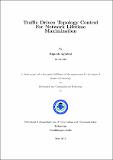Traffic driven topology control for network lifetime maximization
Abstract
Energy consumption is a major concern in ad hoc wireless networks. Network life-time can be
maximized by minimizing the network power consumption. Topology control is one of the
most important mechanisms used for reducing network power consumption. Topology control
can be achieved either by transmit power control or sleep scheduling. In transmit power
control the optimization problem is to find the transmission power at which the power
consumption is minimized while maintaining desired connectivity. In sleep scheduling, nodes
which are redundant are switched on and off using a scheduling algorithm. One of the main
problem with sleep scheduling is whenever the traffic pattern changes, path going through
awake nodes may become longer while there may exist a shorter path considering some of
the sleeping nodes. This will increase per packet transmission energy consumption as well as
end to end delay. In this thesis we propose a traffic aware topology control protocol to solve
this problem. It finds out subset of sleeping nodes to be awakened on the basis of current
traffic scenarios so that total traffic weighted network cost can be minimized at global level
hence saving the overall energy of the network and maximizes the network life- time.
Simulation results show that,our proposed protocol is able to save a signicant amount of
energy while maintaining end to end packet delay.
Collections
- M Tech Dissertations [923]

